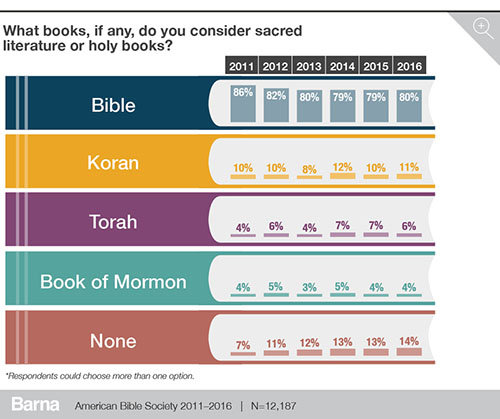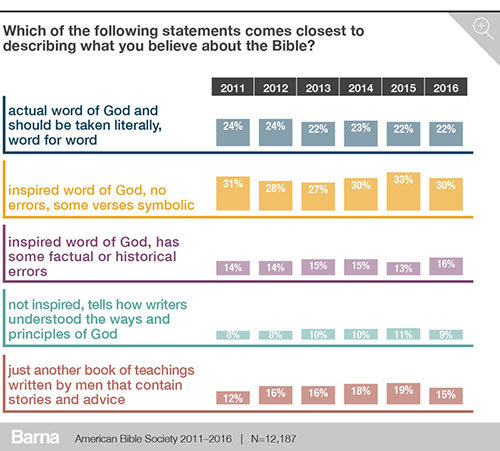 A recent six-year study by Barna Group reveals that while the overwhelming majority of Americans still hold a high view of Scripture, more are also doubting it. GERI-JEAN BLANCHARD/Getty
A recent six-year study by Barna Group reveals that while the overwhelming majority of Americans still hold a high view of Scripture, more are also doubting it. GERI-JEAN BLANCHARD/GettyA recent six-year study by the Barna Group shows that although technology has made Scripture available in a way unprecedented, fewer individuals are taking the opportunity to read it.
In 1991, 45 percent of Americans told Barna they read the Bible weekly. That figure remained steady through 2009, but began to dip to today as around one-third of Americans say they read Scripture once a week.
The determining factor appears to be the growing into adulthood of Millennials, which include the Nones, a subset group defined by not adhering to any organized religion.
“Even in just the few years Barna has been conducting ‘State of the Bible’ interviews, the data is trending toward Bible skepticism,” said David Kinnaman, president of Barna and director of the research. “With each passing year, the percent of Americans who believe that the Bible is ‘just another book written by men’ increases. So too do the perceptions that the Bible is actually harmful and that people who live by its principles are religious extremists.”
Amid the troubling findings for Christians are some bright spots.
The Koran, Torah, and Book of Mormon remained flat or showed slight increases in the number of Americans who consider them holy while the Bible showed a six percent decrease. Those answering “none” in seeing any of those options as sacred literature doubled in the last six years from 7 to 14 percent. The report pointed to Millennials (22 percent) and Gen-Xers (18 percent) as those more likely to see none of those books as holy as opposed to Boomers (8 percent) and Elders (7 percent).

Seeing the Bible as a guide to living a meaningful life also fell, with those answering “strongly agree” to that statement falling from 52 percent in 2011 to 45 percent today. “Disagree strongly,” or those who felt the Bible wasn’t a sufficient guide to a meaningful life, rose from 12 percent five years ago to 18 percent in 2016.
Respondents showed a decline in trust of Scripture as well with a 15 percent drop of those agreeing strongly with the statement “The Bible is totally accurate in all the principles it teaches.” In the same time frame the “Disagree strongly” section grew by 11 percent. Even with those trajectories, 33 percent of Americans still agreed strongly with the Bible’s accuracy as opposed to 23 percent who strongly disagreed. Perspectives on reading the Bible as literal, the inspired Word of God, inspired yet with some factual or historical errors, not inspired, or just another book of teachings written by men remained within three percentage points from 2011.
 The process of Millennials and Gen-Xers becoming adults combines with the shrinking number of older generations, the report stipulates. Researches expect those trends to become more apparent in the coming years as Millennials, for instance, are half as likely (14 percent) to believe the Bible is the actual word of God as Elders (29 percent).
The process of Millennials and Gen-Xers becoming adults combines with the shrinking number of older generations, the report stipulates. Researches expect those trends to become more apparent in the coming years as Millennials, for instance, are half as likely (14 percent) to believe the Bible is the actual word of God as Elders (29 percent).
Skepticism shouldn’t be seen as an altogether bad thing, said Kinnaman. “I believe those questions, when asked and answered honestly and from a biblical point of view, can lead to the Spirit’s work in people’s lives.”